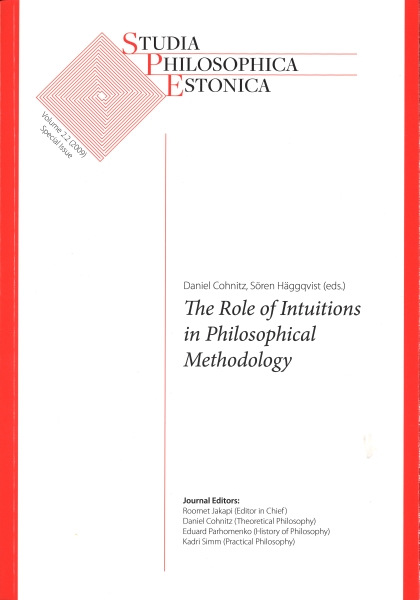If Intuitions Must Be Evidential then Philosophy is in Big Trouble
DOI:
https://doi.org/10.12697/spe.2009.2.2.03Keywords:
intuition, evidence, a priori, inclinations, dispositions, methodology, dispositional, mentalismAbstract
Many philosophers claim that intuitions are evidential. Yet it is hard to see how introspecting one's mental states could provide evidence for such synthetic truths as those concerning, for example, the abstract and the counterfactual. Such considerations have sometimes been taken to lead to mentalism---the view that philosophy must concern itself only with matters of concept application or other mind-dependent topics suited to a contemplative approach---but this provides us with a poor account of what it is that philosophers take themselves to be doing, for many of them are concerned with the extra-mental facts about the universe. Evidentialism therefore gestates a disaster for philosophy, for it ultimately demands an epistemology for the investigation into such matter as the abstract and the modal that simply will not be forthcoming. We make a different suggestion: That intuitions are inclinations to believe. Hence, according to us, a philosophical argument does well, as a socio-rhetorical matter of fact, when it is founded on premises philosophers are generally inclined to believe, whether or not those inclinations to believe connect appropriately to the extra-mental facts. Accordingly, the role of intuitions (inclinations to believe) in philosophical methodology is non-evidential, and the question of how they could be used as evidence falls away.
References
Bealer, G. (1992). The incoherence of empiricism, Proceedings of the Aristotelian Society Supp. 66: 99-143.
Bealer, G. (1998). Intuition and the autonomy of philosophy, in DePaul and Ramsey (eds), Rethinking Intuition: The Psychology of Intuition and its Role in Philosophical Inquiry, Rowman and Littlefield Publishers, Inc, Maryland, pp. 201-239.
Bealer, G. (2000). A theory of the a priori, Pacific Philosophical Quarterly 81: 1-30.
Benacerraf, P. (1973). Mathematical truth, Journal of Philosophy 70:661-679.
Cummins, R. (1998). Reflections on reflective equilibrium, in DePaul and Ramsey (eds), Rethinking Intuition: The Psychology of Intuitionand its Role in Philosophical Inquiry, Rowman and Littlefield Publishers, Inc, Maryland, pp. 113-127.
Earlenbaugh, J. and Molyneux, B. (2009). Intuitions are inclinations to believe, Philosophical Studies 145: 89-109.
Goldman, A. (1992). Cognition and modal metaphysics, Liaisons: Philosophy Meets the Cognitive and Social Sciences, MIT Press, Cambridge, MA, pp. 49-66.
Goldman, A. (1987). Cognitive science and metaphysics, Journal of Philosophy 84: 537-544.
Goldman, A. (2007). Philosophical intuitions: Their target, their source and their epistemic status, Grazer Philosophische Studien 74: 1-26.
Goldman, A. and Pust, J. (1998). Philosophical theory and intuitional evidence, in DePaul and Ramsey (eds), Rethinking Intuition: The Psychology of Intuition and its Role in Philosophical Inquiry, Rowman and Littlefield Publishers, Inc, Maryland, pp. 179-200.
Hume, D. (1748). An Enquiry Concerning Human Understanding. Republished 2008 by Forgotten Books. www.forgottenbooks.org.
Hume, D. (1896). A Treatise on Human Nature, NuVision Publications.
Kagan, S. (1989). The Limits of Morality, Oxford University Press, New York.
Kornblith, H. (1998). The role of intuition in philosophical inquiry: An account with no unnatural ingredients, in DePaul and Ramsey (eds), Rethinking Intuition: The Psychology of Intuition and its Role in Philosophical Inquiry, Rowman and Littlefield Publishers, Inc, Maryland, pp. 129-141.
Levin, J. (2004). The evidential status of philosophical intuition, Philosophical Studies 121: 193-224.
Plantinga, A. (1993). Warrant and proper function, Oxford University Press, New York.
Pust, J. (2000). Intuitions as Evidence, Garlan, New York.
Pust, J. (2001). Against explanationist skepticism concerning philosophical intuitions, Philosophical Studies 106: 227-258.
Sider, T. (2001). Four-dimensionalism: An Ontology of Persistence and Time, Clarendon Press, Oxford.
Sosa, E. (1998). Minimal intuition, in DePaul and Ramsey (eds), Rethinking Intuition: The Psychology of Intuition and its Role in Philosophical Inquiry, Rowman and Littlefield Publishers, Maryland, pp. 257-270.
Strawson, P. F. (1959). Individuals, Methuen, London.
Williamson, T. (2007). The Philosophy of Philosophy, Blackwell, Oxford.





